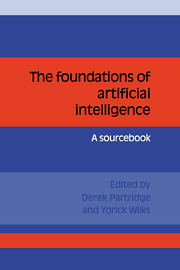Book contents
- Frontmatter
- Contents
- List of contributors
- Preface
- Acknowledgments
- 1 Introduction
- 2 The formal foundations of AI
- 3 Levels of theory
- 4 Programs and theories
- One small head: models and theories
- The nature of AI principles
- Artificial methodology meets philosophy
- 5 The role of representations
- 6 The role of programs in AI
- 7 Rational reconstruction as an AI methodology
- 8 Is AI special in regard to its methodology?
- 9 Does connectionism provide a new paradigm for AI?
- 10 The role of correctness in AI
- 11 Limitations on current AI technology
- 12 Annotated bibliography on the foundations of AI
- Index of names
The nature of AI principles
Published online by Cambridge University Press: 03 May 2010
- Frontmatter
- Contents
- List of contributors
- Preface
- Acknowledgments
- 1 Introduction
- 2 The formal foundations of AI
- 3 Levels of theory
- 4 Programs and theories
- One small head: models and theories
- The nature of AI principles
- Artificial methodology meets philosophy
- 5 The role of representations
- 6 The role of programs in AI
- 7 Rational reconstruction as an AI methodology
- 8 Is AI special in regard to its methodology?
- 9 Does connectionism provide a new paradigm for AI?
- 10 The role of correctness in AI
- 11 Limitations on current AI technology
- 12 Annotated bibliography on the foundations of AI
- Index of names
Summary
Tell me your problems: a psychologist visits AAAI 82
Stellan OhlssonIntroduction
Following the advice of the philosopher Karl Popper to remember that science is about problems and their solutions I expected each paper on the American Association for AFs 1982 conference (AAAI 82) held in Pittsburgh to contain two main parts: (a) the problem attacked, and (b) its proposed solution. In fact, almost no speaker stated an information-processing problem, and even fewer proposed solutions to one. The problems I want to address here are “What is an information processing problem?” and “If AI speakers do not present solutions to such problems, what do they, in fact, do?” The proposed solutions are presented forthwith.
Information processing problems
What kind of problems does AI research solve? The answer may seem self-evident: “How to program a computer to do X?”, where X is medical diagnosis, natural-language understanding, etc. But such questions will soon be of very little interest. In a few decades' time, any school teacher will be able to make a computer do amazing things, without any knowledge of computer science. If you doubt this, then you have not imagined an instructable production system with a sophisticated natural-language interface, running on a descendant of the Cray supercomputer. In fact, the schoolteacher is likely to find it easier to instruct the computer.
- Type
- Chapter
- Information
- The Foundations of Artificial IntelligenceA Sourcebook, pp. 135 - 154Publisher: Cambridge University PressPrint publication year: 1990
- 4
- Cited by



